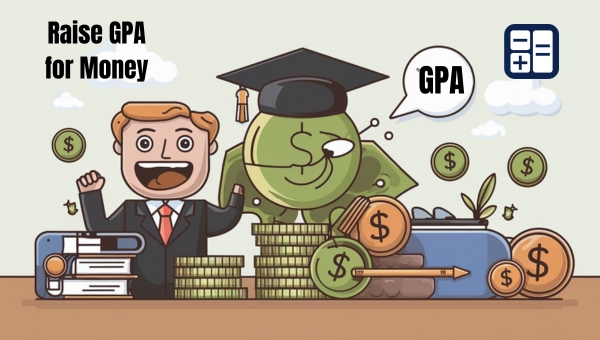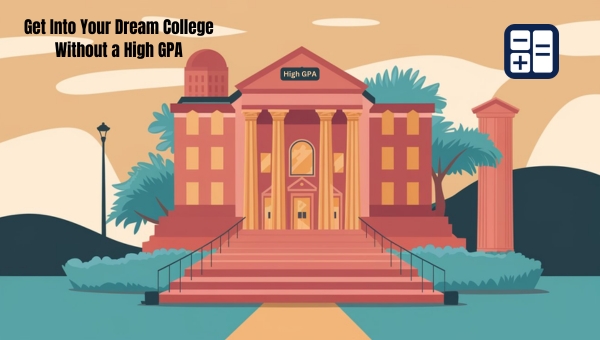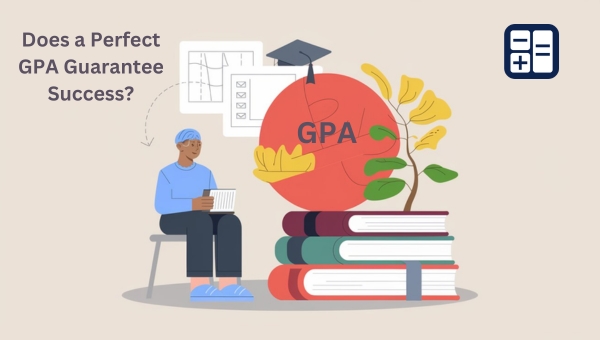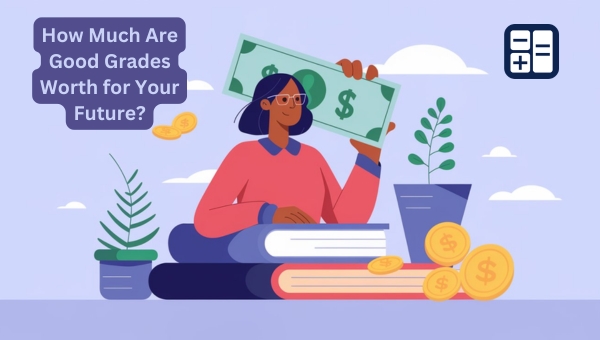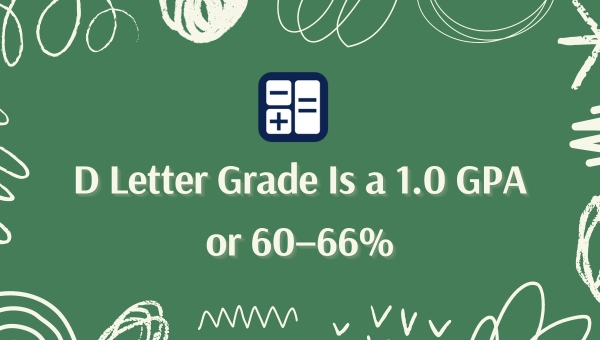B Letter Grade Is a 3.0 GPA or 83–86%
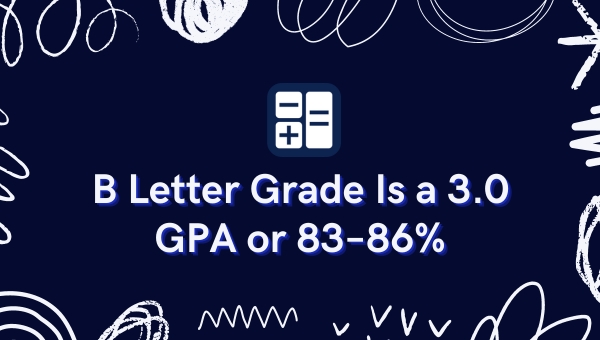
You’re likely aware that a B letter grade translates to a 3.0 GPA, or an 83% to 86% score, reflecting a commendable yet improvable understanding of your coursework. But what does that mean for you as a high school student aiming for college?
This grade can significantly impact your college applications, but the question remains—how can you make the most of a B GPA while identifying areas for improvement? Let’s explore some strategies that can help you leverage your academic performance effectively and set yourself up for success.
What is a B GPA?
A B GPA typically refers to a grade point average that falls within the range of 3.0 to 3.3 on a 4.0 scale. You get this GPA by consistently earning B grades in your coursework. A B grade usually translates to percentages between 83% and 86%, depending on your school’s grading system.
When you’re calculating your GPA, each B grade contributes positively, but not maximally, to your overall average. For instance, if you receive a B in a 3-credit class, you multiply the grade points (3.0) by the credits (3), resulting in 9 grade points for that class. You then sum up all your grade points and divide by the total number of credits taken.
Achieving a B GPA means you’re performing above average. It reflects a good understanding of your subjects, though there’s room for improvement.
It’s essential to keep track of your grades throughout the semester to maintain or enhance your GPA. If you find yourself struggling in any course, seek help from your teachers or consider tutoring options. Staying organized and managing your time effectively can help you maintain or even boost your GPA.
What does a B GPA mean for high school students?
A B GPA can influence your college application strategy by helping you identify safety, target, and dream schools.
You’ll want to consider schools where your chances of admission are high, as well as those that match your GPA closely.
It’s also important to include a few aspirational colleges that might be a reach but are worth applying to.
Safety Schools
For high school students, a B GPA can play a crucial role in shaping their college application strategy, particularly when it comes to identifying safety schools.
Safety schools are institutions where your academic credentials, including your GPA, exceed the school’s average admissions criteria. A B GPA, typically translating to a 3.0 or 83-86%, means you need to be smart about selecting these schools.
Here’s how you can effectively identify safety schools:
- Research Admission Statistics: Look for colleges where the average admitted student’s GPA is below or around 3.0. This ensures you’re likely to be accepted.
- Consider Acceptance Rates: Schools with higher acceptance rates are generally less selective, making them more likely to admit students with a B GPA.
- Leverage Local Options: In-state public universities often have favorable admission criteria for residents, increasing your chances of acceptance.
- Assess Fit Beyond Academics: While GPA is crucial, don’t ignore other factors like campus culture, location, and available programs that align with your interests.
Target Schools
When considering target schools, a B GPA doesn’t have to be a barrier to finding the right fit for your college journey. Many institutions value well-rounded students who bring more than just grades to the table. Your GPA is just one part of your application, and there are several ways you can strengthen your chances of being accepted into your target schools.
- Highlight Extracurricular Activities: Colleges appreciate students who are involved in clubs, sports, or volunteer work. Showcasing leadership roles or long-term commitments can make your application stand out.
- Craft a Strong Personal Statement: Your essay is an opportunity to tell your story. Explain your passions, challenges you’ve overcome, and why you’re a good fit for the school. Make it personal and compelling.
- Secure Strong Letters of Recommendation: Teachers and counselors who know you well can provide insights into your character and academic potential. Choose recommenders who can speak to your strengths and contributions.
- Prepare for Standardized Tests: Solid SAT or ACT scores can bolster your application. Consider investing time in test prep to improve your scores, which can offset a lower GPA.
Dream Schools
While target schools offer a range of possibilities, dream schools often symbolize the pinnacle of your academic aspirations. A B GPA, translating to a 3.0 or 83-86%, might initially seem like a barrier to these prestigious institutions.
However, it’s important to remember that admissions committees evaluate more than just grades. With strategic planning and dedication, you can still make a compelling case for your application.
Here are four key strategies to enhance your profile:
- Extracurricular Activities: Showcase your involvement in clubs, sports, or volunteer work. Leadership roles and long-term commitments can significantly bolster your application.
- Personal Statement: Craft a compelling narrative that highlights your unique experiences, personal growth, and aspirations. A strong essay can make a lasting impression on admissions officers.
- Strong Recommendations: Seek out teachers or mentors who know you well and can provide detailed, enthusiastic endorsements of your abilities and character.
- Standardized Test Scores: Excelling in SAT or ACT exams can help offset a lower GPA. Dedicate time to thorough preparation and consider retaking the test if necessary.
Proven Tips to Get a B GPA
To achieve a B GPA, you need to focus on effective study techniques and manage your time well.
Actively participate in class, complete your homework consistently, and don’t hesitate to seek extra help when needed.
These steps will set you on the right path toward your goal.
Effective Study Techniques
Mastering effective study techniques is crucial if you’re aiming to achieve a B GPA. Start by creating a dedicated study space free from distractions. This helps you focus better and enhances productivity.
Next, make use of active learning methods like summarizing information in your own words, teaching the material to someone else, or creating mind maps. These techniques engage your brain more deeply than passive reading.
Don’t underestimate the power of practice tests. They help you familiarize yourself with the exam format and identify areas that need more attention. Always review your mistakes to understand where you went wrong.
Flashcards are another excellent tool for memorizing key concepts and terms.
Consistency is key. Instead of cramming, break your study sessions into manageable chunks spread throughout the week. This not only makes the material easier to digest but also improves retention.
Additionally, don’t ignore the importance of taking breaks. Short, regular breaks can actually boost your overall productivity and keep your mind fresh.
Lastly, don’t hesitate to seek help if needed. Study groups or tutoring can provide different perspectives and explanations that might make difficult topics easier to understand.
Time Management Skills
Effective time management is essential for achieving a B GPA. Start by creating a weekly schedule that outlines your classes, study sessions, and other commitments.
Prioritize your tasks by listing them in order of importance. This way, you’ll focus on what matters most first.
Break your study sessions into manageable chunks. Instead of cramming for hours, study in 25-30 minute intervals with short breaks in between. This technique, known as the Pomodoro Technique, keeps you focused and reduces burnout.
Don’t procrastinate. Set specific deadlines for each assignment and stick to them. Use tools like calendars, planners, or apps to keep track of your deadlines and progress.
This will help you avoid last-minute stress and ensure steady progress.
Learn to say no to distractions. Put your phone on silent, and find a quiet place to study. Social media and other distractions can wait until you’ve completed your tasks.
Active Class Participation
Engaging actively in class can significantly boost your chances of achieving a B GPA. When you participate, you show your professors that you’re invested in the material, which can influence their perception of you in a positive way. Start by sitting at the front of the class. This simple change can help you stay focused and make it easier to engage with the instructor.
Don’t hesitate to ask questions. If something isn’t clear, raise your hand and ask for clarification. Not only will this help you understand the material better, but it’ll also demonstrate your commitment to learning.
Participating in discussions is equally important. Share your thoughts and opinions on the topic at hand. This will deepen your understanding and help you retain information.
Another key tip is to take thorough notes. When you’re actively writing down important points, you’re more likely to remember them later. Be sure to review these notes regularly.
Lastly, form study groups with classmates. These sessions can provide different perspectives and help you grasp complex concepts more easily. Active class participation is a straightforward yet powerful way to elevate your academic performance.
Consistent Homework Completion
Consistency is key when it comes to homework completion, and it’s one of the most reliable ways to secure a B GPA. By setting aside specific times each day for homework, you create a routine that helps you stay on track.
Make sure your study environment is free from distractions—turn off your phone, find a quiet spot, and focus solely on your assignments.
Don’t underestimate the power of a planner. Use it to write down all your homework assignments and their due dates. This helps you avoid last-minute cramming and ensures you meet all deadlines.
Additionally, breaking larger assignments into smaller, more manageable tasks can make them less overwhelming and easier to complete on time.
It’s also important to review your notes regularly. Doing so reinforces the material and makes homework feel less burdensome.
If you encounter challenging problems, don’t hesitate to revisit your textbooks or class notes; these resources are invaluable.
Seeking Extra Help
While consistent homework completion lays a solid foundation for academic success, there are times when you’ll need extra help to maintain a B GPA. Don’t hesitate to seek out resources when you’re struggling with a particular subject.
Start by asking your teacher for additional guidance or clarification on topics you find challenging. They can provide invaluable insights and may offer extra credit assignments to help boost your grade.
Your school likely has tutoring services available. Make use of peer tutors or professional tutors who can break down complex concepts and offer personalized help.
Study groups can also be beneficial, allowing you to learn from classmates and explain concepts to others, reinforcing your own understanding.
Online resources can be a goldmine of information. Websites like Khan Academy, Coursera, and even YouTube offer tutorials on a wide range of subjects.
These resources can supplement your learning and provide different perspectives on the material.
How to Raise Your GPA Fast?
Boosting your GPA quickly requires a strategic approach and dedication. First, identify the subjects where you’re struggling the most. Focus your energy on improving grades in those areas since raising a low grade will have a bigger impact on your GPA.
Next, communicate with your teachers. Don’t hesitate to ask for extra assignments or opportunities to make up for past poor performance. They can provide valuable insights into where you need to improve and might offer extra credit work.
Time management is crucial. Create a detailed study schedule and stick to it. Prioritize your tasks and ensure you allocate enough time for each subject. Use tools like planners or apps to keep track of deadlines and upcoming exams.
Form or join a study group. Collaborating with peers can offer new perspectives and help you understand challenging material better. Plus, teaching others is a great way to reinforce your own knowledge.
Lastly, seek additional resources like online tutorials, study guides, or tutoring services. Sometimes, a different explanation or approach can make complex topics easier to grasp.
Conclusion
Achieving a B GPA means you’ve demonstrated solid academic performance, but there’s still room to grow. Leverage this by highlighting your strengths in college applications and addressing areas for improvement through strategic academic and extracurricular activities.
By focusing on proven study techniques and seeking help when needed, you can elevate your GPA quickly. Stay motivated, and remember, every effort you make brings you one step closer to your academic goals.
